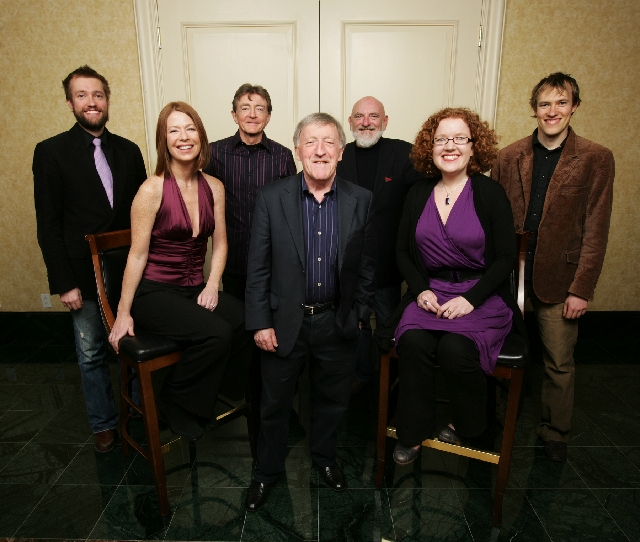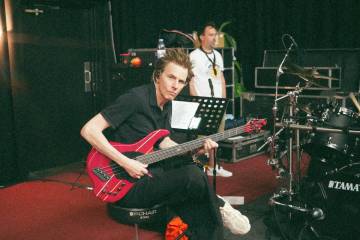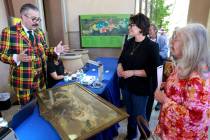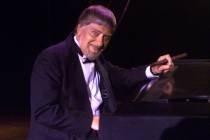Award-winning Chieftains making Smith Center debut
The Chieftains have six Grammy Awards.
But the chief Chieftain — group founder and leader Paddy Moloney — acknowledges a bit of disappointment that they weren’t in the running this year for “Voice of Ages,” their 50th anniversary album.
“We need a few more,” Moloney says.
Not that the Chieftains would have been able to attend last weekend’s Grammy ceremony in Los Angeles anyway; they already were booked in Gainesville, Fla., the second of 28 dates on their current U.S. tour.
Las Vegas is No. 8 on the list — right after Los Angeles, just before Omaha, Neb. — as the Chieftains make their Smith Center debut Monday in Reynolds Hall.
It’ll be a month before St. Patrick’s Day, but no matter.
At a Chieftains concert, the Celtic spirit burns just as brightly on Feb. 18 as it does on March 17, whether the setting is Las Vegas — or outer space.
After all, NASA astronaut Catherine “Cady” Coleman, direct from the International Space Station, was one of the many musical guests on “Voice of Ages,” playing a 300-year-old tune titled “Fanny Power” on a tin whistle Moloney gave her — and a wooden flute contributed by resident Chieftains flutist Matt Molloy.
“Next stop: Mars!” Moloney jokes during a pretour telephone interview, which more closely resembles a friendly chat at an Irish pub.
One where Moloney does almost all the chatting, without much need for an interviewer’s interruptions — not with a half-century of music- and memory-making on which to draw.
Moloney mentions his work on movie scores (from 1975’s “Barry Lyndon” to 2002’s “Gangs of New York”) and remembers the time he was once asked to act as well as provide music.
He agreed, as long as the project wouldn’t “have any stage Irish” dialogue. But once he read the script, peppered with multiple utterances of “b’gosh and begorrah,” Moloney “backed off.”
So much for his acting debut.
But Moloney, now 74, has had a grand career playing the role of a lifetime: himself.
During the 50 years the Chieftains have been spreading the gospel of traditional Irish music, they’ve collaborated with rock royalty from Van Morrison to Joni Mitchell, Sting to the Rolling Stones.
The collaborations continued on “Voice of Ages,” Moloney notes, because “we didn’t want to do the usual ‘Best of the Chieftains’ thing,” despite the 50th-anniversary celebration. “We wanted something fresh and new.”
Enter such “indie contemporary songwriters and performers” as the Decemberists, the Carolina Chocolate Drops, the Pistol Annies and Lisa Hannigan.
Oh, and some old friends — retired Chieftains members — who returned for a “Chieftains reunion track,” Moloney notes.
They might not be along on the tour, but the Chieftains have plenty of company just the same.
There’s Moloney, who plays uilleann pipes and tin whistle, and Molloy on flute. Fellow Chieftains include bodhran player and vocalist Kevin Conneff , harp and keyboard player Triona Marshall, vocalist and percussionist Alyth McCormack , fiddler and dancer Jon Pilatzke , fiddler and mandolin player Deanie Richardson and guitarist and vocalist Jeff White, along with dancers Cara Butler and Nathan Pilatzke .
(And if Pilatzke doesn’t sound like much of an Irish name, you’re right — the Pilatzke brothers hail from Canada’s Ottawa Valley.)
And if that’s not a big enough performing contingent, “we will be asking one the local pipe bands to join us onstage,” Moloney says.
Butler generally coordinates with local dancers to collaborate on the show, he adds.
But local audience members also “should bring their dancing shoes,” Moloney warns, “because we invite the audience to do a kind of shuffle” — a Breton dance — as part of the show. At New York’s Carnegie Hall and London’s Royal Albert Hall, “people came on stage” to join in the song and dance.
Moloney cites “the great joy, at the end of the evening, to see people on their feet.”
But that’s the response the Chieftains have come to expect wherever they go.
Playing in Italy, audiences “wouldn’t understand a word,” Moloney acknowledges, “but they got the melodies.”
And as the Chieftains found during two recent tours to Japan, “the Japanese go wild,” he says. “They have a Chieftains folk club — a huge young audience who are following us now.”
Not surprisingly, Moloney attributes that response to the music itself.
Irish music, he explains, “has so much incredible variety,” in part because “the Irish have survived so many things, but they never lost the folk art — or the beautiful language” revealed in their music.
They can be “rebel songs, songs of love and heartbreak, bad times and good times — it’s vast,” Moloney says. “The pot is bottomless.”
So is the power of the music, he adds, citing a concert in Japan featuring the Chieftains playing with a symphony orchestra.
Audience members “in the front row were weeping,” he recalls. “There’s sad music and there’s happy music — and people feel very much that this is their music.”
Whenever and wherever the Chieftains go.
Contact reporter Carol Cling at ccling@reviewjournal.com or 702-383-0272.
Preview
The Chieftains
7:30 p.m. Monday
Reynolds Hall, The Smith Center for the Performing Arts, 361 Symphony Park Ave.
$29-$89 (749-2000, www.thesmithcenter.com)






















